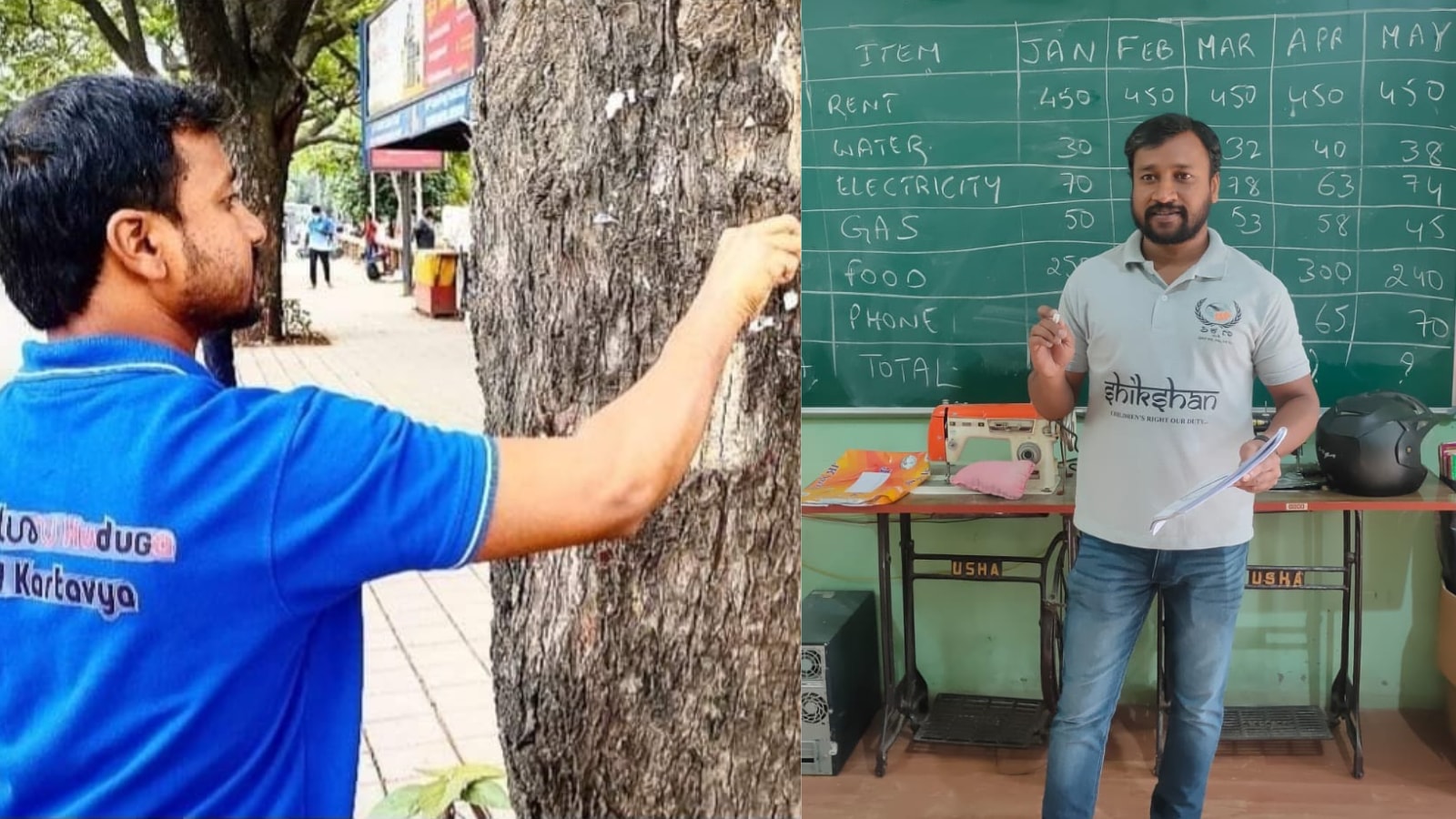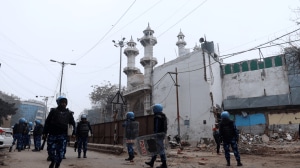‘They only live, who live for others, the rest are more dead than alive’- this is exactly how Vinod Somashekar also popularly known as Vinod ‘Kartavya’ describes his life in a sentence. Borrowed from the teachings of Swami Vivekananda, Vinod is indeed living up to his name. From teaching computer applications to government school students to spearheading the ‘Nail-free tree’ campaign and now making efforts to save Vrishabhavathi Lake, Vinod has got his hands full on a lot of social and civic issues impacting the people of Bengaluru.
The 39-year-old is a technical officer at DRDO (Defence Research and Development Organization). But like any other young mind he had different plans for himself. Vinod wanted to become a Chartered Accountant, given his initial belief of receiving good income out of this career coupled with his ambition to bring his family out of poverty. However, he stumbled upon the vacancy at DRDO through his friend and applied for the job of a technician. While he made a breakthrough and landed the job, he was only half hearted after securing a government job which fetched him a monthly salary of Rs 5000.

 When many in Bengaluru refer to the Vrishabhavathi river as ‘Kengeri Drain’, Vinod is making efforts to change the perspective and invoke a behavioral change among the society to understand the importance of the water body by calling it a ‘river’ and not a drain (Photo: Sourced)
When many in Bengaluru refer to the Vrishabhavathi river as ‘Kengeri Drain’, Vinod is making efforts to change the perspective and invoke a behavioral change among the society to understand the importance of the water body by calling it a ‘river’ and not a drain (Photo: Sourced)
Kartavya
However, what changed later was the line from Swami Vivekananda’s biography- ‘They only live, who live for others, the rest are more dead than alive’. Dotted with poverty and poor housing conditions at Bengaluru’s Sampangiramnagar, Vinod believed that the salary he earned through the government job, is the taxpayers money and that it is just about time to give it back to the society. Which is when in 2013, Vinod started off with his group of friends visiting orphanages around Bengaluru and helped them solve basic issues such as providing access to clean drinking water. This is also the time when Vinod earned his moniker ‘Kartavya’.
Shikshan
In 2016, Vinod started his second initiative called ‘Shikshan’, which is aimed at imparting knowledge of government school students, specifically in computer applications. “When I used to study in a private school near my house, I realized that if we were 50 students coming out of the gate after class, a government school right opposite my school, had over 200 students coming out of the gate around the same time. But now the trend has reversed. When I inquired with government school teachers about the increasing dropout rate in the government school, I learnt that poor infrastructure and amenities is what led to huge drop outs.” He added, “Which is when we thought my friends and I would engage students in computer science classes every Saturday on a voluntary basis. We pooled in funds and bought a refurbished computer for Rs 30,000. We are currently conducting classes every Saturday across eight schools in Bengaluru and one school in Kolar.”
Nail–free tree
It was a bright sunny day when Vinod was on his phone and taking a stroll in his neighborhood. Just when he rested his head on a tree he was pricked by a nail. This was the tipping point for Vinod to start the Nail-free tree campaign in 2020. “If I went through so much pain when the nail pricked me, imagine how much pain the tree would have undergone when the nails were pierced into it? When I started removing nails and staples from trees, people in the neighborhood thought I was a maniac. People laughed and made fun of me. As a result, my friends and I decided to remove these nails early in the morning at 6 am,” said Vinod, who started addressing such issues under the name ‘Bengaluru Hudugaru’.
Till date, Vinod and his team has reached 2500 trees in Bengaluru and has recovered 8000 nails and close to 10kgs of staples. He was also instrumental in urging the civic authorities and the police department to initiate legal action against offenders who pierce nails and staples into the trees under Karnataka Open Places Disfigurement Act and Karnataka Tree Protection Act. He also creates awareness in schools and colleges about the need to conserve trees and to refrain from indulging in acts that harm trees.
Exposing the beggar mafia
Story continues below this ad
While keeping his hands full on environment and education related issues, Vinod was also moved by what he claims as the ‘beggar mafia’. “Near the MG Road signal I saw a woman with her baby girl begging for money. Just when I thought the baby was asleep, the next few minutes moved my conscience completely. I saw the mother using some chemical or liquid to make the baby unconscious and then she was back at the signal begging. This triggered a series of emotions within me and I pictured my young son in the baby girl’s position,” said Vinod. This incident set off yet another initiative to create awareness in traffic junctions discouraging commuters to not give beggars money. Vinod learnt that the alleged ‘begging mafia’ is a product of woman and child trafficking and are micromanaged by some miscreants. “My message through this initiative was to tell the public that giving money to beggars means they are encouraging women and child trafficking.”
 While keeping his hands full on environment and education related issues, Vinod was also moved by what he claims as the ‘beggar mafia’. (Photo: Sourced)
While keeping his hands full on environment and education related issues, Vinod was also moved by what he claims as the ‘beggar mafia’. (Photo: Sourced)
‘Let us understand Vrishabhavathi’
When many in Bengaluru refer to the Vrishabhavathi river as ‘Kengeri Drain’, Vinod is making efforts to change the perspective and invoke a behavioral change among the society to understand the importance of the water body by calling it a ‘river’ and not a drain. “I started the initiative to improve the Vrishabhavathi river a year ago in collaboration with Revival Heritage Hub. The river is being infiltrated and polluted by localities, industry bodies in different areas of Bengaluru like Magadi Road, Malleswaram, Peenya, which is contaminating the water body. Our idea is to visit such places and help them understand the story behind the river and how it serves as a lifeline to Bengalureans,” said Vinod.
He adds that, “The idea is to change one mind at a time. The river, which is polluted all through Bengaluru, reaches Byramangala (40 km from Bengaluru) with sewage content and the villages in this town use the river as a source for agricultural activities. They grow corn, tomato, carrot and other vegetables using this polluted water. Hence it is important to create awareness and effect a social change by prioritizing Vrishabhavathi river as a national project and not a state project.”
Story continues below this ad
However, what has upset Vinod all through his journey as an independent social activist is the lack of will to implement ideas. “While I have strived hard to introduce several social initiatives, the implementation aspect is a major challenge. Especially with issues that have the government as a stakeholder, things move at a snail’s pace or are subdued by politics. However, overall I believe that what I have done so far in life is not a duty but a moral responsibility as a citizen, which is enshrined within the Indian Constitution.”



 When many in Bengaluru refer to the Vrishabhavathi river as ‘Kengeri Drain’, Vinod is making efforts to change the perspective and invoke a behavioral change among the society to understand the importance of the water body by calling it a ‘river’ and not a drain (Photo: Sourced)
When many in Bengaluru refer to the Vrishabhavathi river as ‘Kengeri Drain’, Vinod is making efforts to change the perspective and invoke a behavioral change among the society to understand the importance of the water body by calling it a ‘river’ and not a drain (Photo: Sourced) While keeping his hands full on environment and education related issues, Vinod was also moved by what he claims as the ‘beggar mafia’. (Photo: Sourced)
While keeping his hands full on environment and education related issues, Vinod was also moved by what he claims as the ‘beggar mafia’. (Photo: Sourced)





